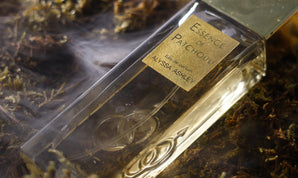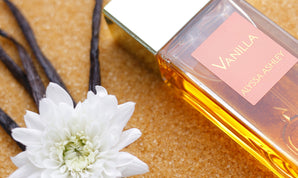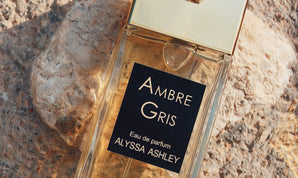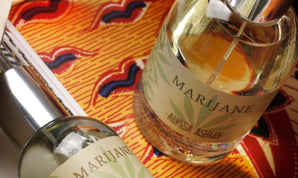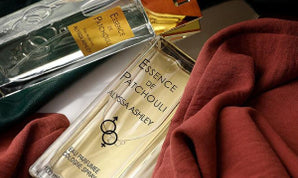Multisensory art is a relatively “modern” concept.
Since childhood, we have been taught “look but don’t touch” or to “listen but don’t watch”, so we grew up (in most cases) believing that our senses were separate entities, and that they can only work together in some small portions of our lives.
Our approach to art, whichever form it may be in, is therefore a product of our sensory education.
How many of you believe a painting can not only be looked at, but smelled too? Even “tactile” art such as statues have always been confined to being looked at for centuries, when touching works of art and interacting with them was considered a deadly sin.
My relationship with art and, at the same time, with the world of perfumery has often lead me to “play” with the senses, and to ask myself what the scent of a work of art could be, and, vice versa, which image, movement, artistic expression or feeling deriving from it could be connected to a certain scent.
I like to keep this in mind while I’m creating new perfumes, which are also works of art, as they are an expression of the art of perfumery.
The Tonka beans’ bedtime story
One of my most recent creations is called Tonka Musk, and it was created as a homage to the element that made Alyssa Ashley a cult brand: Musk. To celebrate such an important and landmark component of my world I carefully chose the raw materials I would match it with.
I have already spoken about the rose and its qualities, but now I would like to take you to a place far away with the Tonka bean
I imagined a dream perfume, literally. Something able to transport you somewhere else, where time and space have no definition, where reality and imagination blend. The great power of a scent is that of having an immediate effect on people’s emotions: pushing away the problems of the outside world (even just for a short time) and allowing us to have an intimate moment of introspection. After all, is this not also a prerogative of all art forms?
Tonka beans are known to have a calming and relaxing effect, they are characterised by a sweet and grassy smell, a scent that makes you feel reassured. When breathing it in, you feel like closing your eyes and imagining your own, personal dream world, with a smile on your face.
Dream worlds and a detachment from reality, dreams and pleasurable feelings have always been an inspiration as well as a subject for the Surrealist Movement, and in particular for its most prominent and world renowned exponent: Salvador Dalì
Salvador Dalì’s dream world
How can I transmit this feeling, not only from the olfactory point of view, by using the sweetness of Tonka and Coumarin, but also visually? Dreams are not a new concept in the world of art, they have always been and always will be an inspiration for many, but only few artists have been able to interpret it in such a clear and empathetic way as Salvador Dalì.
The Spanish artist managed to transform every-day objects into super-objects by using the subconscious, placing them in his works by deforming and collocating them in an apparently accidental way which gives us the typical feeling of the organised chaos of dreams.
Dalì’s works have undoubtedly gained fame thanks to the artist’s charismatic and irreverent character, but also for their autobiographical and spontaneous qualities. The artist himself once said:
""I paint images that fill me with joy, which I create with absolute naturalness, without worrying about aesthetics, I make things that give me emotions”
The emotions deriving from the fruition of his art (ranging from painting to sculpture, design, cinema, fashion and theatre) are diverse thanks to the multiplicity of his production. The dream-like aspect characterises all his artistic career, from the most extreme surrealism to symbolism, where being led to another world separates the individual from the hic et nunc, here and now, re-defining the concept of time. This was one of the concepts and symbols most used by Dalì.
The work that most represents the Catalan artist’s interest in time is “The Persistence of Memory”, also known as “Melting Clocks”, which I chose to associate with my perfume inspired by the Tonka bean. Its sublime fragrance is capable of projecting you into your dream world where time is relative, just like in Dalì’s painting. I wanted to share this exact feeling of liberation from preset constraints.
Time as seen by Dalì
Dalì saw time as the evil of the modern and contemporary world, so important as to gain monetary value, to become both a trade good and “illness”. Referring to Einstein’s well-known special theory of relativity, Dalì defined time as entirely subjective and arbitrary, sometimes still and unmovable and others as fast as a dart. The story of how Dalì got the inspiration for his clocks is quite known: one day, while reflecting alone on the idea of time, sitting at the table while having lunch, he observed a camembert cheese melting in the heat of the sun. That idea of non-shape, malleability and softness inspired him on how to visually represent time as a manipulable and modifiable element.
A suspended time, the one we are all immersed in, just like in dreams, where only the personal aspects can determine its entity.
Again in this case too, every individual’s emotions and mood change their perception of time, and label a concept that has no tangibility or definition. If we are sad or anxious, time to us feels never ending and slow, if we feel scared, we cannot perceive it, if we are happy, it will fly.
Perfumes, as we have said numerous times, can strongly influence our “emotional system”, they are not only capable of stimulating new emotions, but most of all they are capable of awakening memories and past emotions we have buried in our minds. We perceive time through these memories, and give it a new definition, perfume can be considered as a true filter for time.
Back in time with memories, outside of time with its bewitching qualities, inside an altered time with its soothing ones: Tonka Musk is a perfume that has a lot to do with time, with dreams and with the most intimate sides of our personalities.

